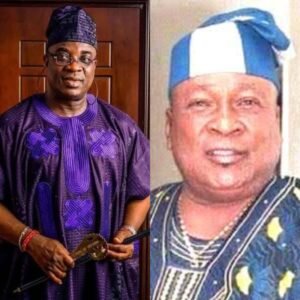
By Ibrahim Kegbegbe
In a recent revealing interview, Fuji music legend, King Wasiu Ayinde Marshal, popularly known as K1 De Ultimate, did not hold back his emotions as he expressed deep-seated disappointment over the treatment he received from members of the Fuji Musicians Association of Nigeria (FUMAN) and veteran fuji artiste, General Kollington Ayinla.
The “Ade Ori Okin” crooner, who has often been hailed as one of the major forces behind the modernization and global promotion of Fuji music, lamented what he described as “total ingratitude” from some members of the association and the Fuji music community.
“I brought Fuji to BAM (Best Alternative Music), I brought Fuji to Oprah through which most young Fuji artistes are earning a living today,” K1 said, emphasizing his pivotal role in expanding the reach and commercial viability of Fuji music in Nigeria and beyond.
K1, whose influence in Fuji spans over four decades, recounted some of his contributions to FUMAN, noting that he not only bought a bus for the association but singlehandedly registered it officially, initiated the constitution that currently guides its activities, and has consistently provided financial support to many members.
“Let any member of FUMAN come outside and tell the whole world what they have done for me. I have assisted many of them in ways they cannot deny,” he challenged.
The Fuji maestro also recalled the critical roles he played during the bereavements of prominent Fuji icons, including the late Alhaji Sikiru Ayinde Barrister and Alhaji Kollington Ayinla’s mother.
“When the mothers of Barrister and Kollington Ayinla died, I organized befitting shows for them, both financially and morally. I personally invited government agencies that graced the occasions. I also hosted artistes’ nights for them,” K1 recounted bitterly.
However, the legend expressed sadness that during the burial of his own mother, the same honor was not accorded him by FUMAN or his colleagues.
“Did FUMAN organize an artistes’ night for my mother?” he asked rhetorically, adding, “Even General Kollington Ayinla, whom I arranged a N5,000,000 monthly allowance for as an elder in the Fuji industry after Barrister’s demise, failed to show up for my mother’s burial.”
The revelations from K1 have sparked renewed discussions among fans and stakeholders in the Fuji music industry about loyalty, gratitude, and the politics within the genre’s inner circle. Many of his supporters have taken to social media, praising K1 for his courage in speaking out, while others are calling for reconciliation among the Fuji greats for the sake of the younger generation.
K1 De Ultimate, born Wasiu Omogbolahan Olasunkanmi Adewale Ayinde Marshal, is widely recognized for transforming Fuji music from its traditional roots to a more modern, youth-friendly sound. His innovations opened doors for many younger artistes like Pasuma, Saheed Osupa, Malaika, and others who today enjoy broader acceptance and commercial success.
FUMAN, the Fuji Musicians Association of Nigeria, was formed to protect the interests of Fuji artistes, but internal conflicts have often marred its unity over the years. K1’s revelations bring to light long-standing cracks within the body that many insiders had whispered about but never publicly addressed.
As fans continue to digest the bombshells from K1, one thing is certain: the Fuji music industry faces a critical moment of introspection, and the call for healing has never been louder.

















